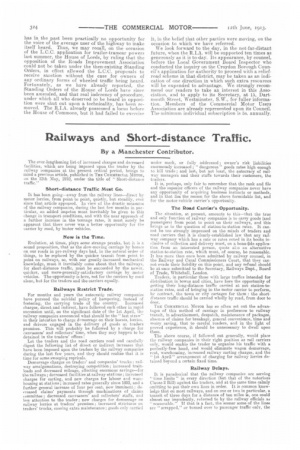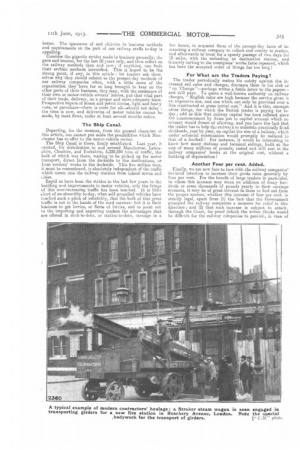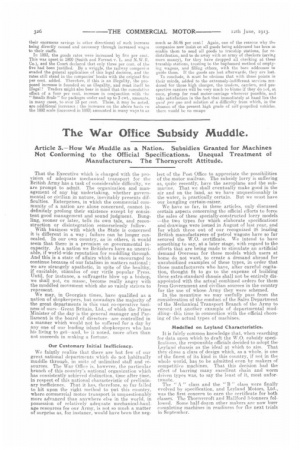Railways and Short.distance Traffic.
Page 2

Page 3

Page 4

If you've noticed an error in this article please click here to report it so we can fix it.
By a Manchester Contributor.
The ever-lengthening list of increased charges and clecreaeed facilities, which are being imposed upon the trader by the railway companies at the present critical period, brings to mind a. previous article, published in THE CommEaciAL MOTOR, on the 12th May, 1910, under the title of " Short-distance traffic."
Short-distance Traffic Must Go.
It has been going—away from the railway lines—direct by motor lorries, from point to point, quietly, but steadily, ever since that article appeared. In view of the drastic measure; of the railway companies, during the last few months in particular, an added impetus must inevitably be given to this change in transport conditions, and with the near approach of a further increase in the tonnage rates, it must surely be apparent that there never was a better opportunity for the earner by road, by Motor vehicles.
Now is the Time.
Evolution, at times, plays some strange pranks, but it is a sound proposition, that as the slow-moving carriage by horses on our roads in pre-railway days had, in the natural order of things, to be replaced by the quicker transit from point to point on railways, so, with our greatly-increased mechanical knowledge, must it inevitably come about that the railways, for short-distance traffic must be succeeded by the newer, quicker, and more.geneLly-satisfactory carriage by muter vehicles. The opportunity is here, not for the carriers by road alone, but for the traders and the carriers equally.
Railways Rastrict Trade.
For months and years the autocratic railway companies have pursued the suicidal pelicy of hampering, instead of fostering, the carrying trade of the country. Increased charges, direct and indirect, have followed each other in rapid succession until, on the significant date of the 1st April, the railway companies announced what should be the 'last strew" in their intention to charge demurrage on their horses, lorries, and drivers engaged in the delivery of goods at traders premises. This well probably be followed by a charge for canvassers' and collectors' time, when they may happen to be detained in the traders' offices Let the traders and the road carriers read and carefully digest the following list of direct or indirect increases that have been imposed upon the traders by the railway companies during the last few years, and they should realize that it is time for some sweeping reprieale. Demurrage charges on traders' and companies' trucks ; railway amalgamations, destroying competition; increased trainloads and decreased mileage, effecting enormous savings—for the railways; decreased facilities at railway stations ; inereaeed charges for carting, and new charges for labour and warehousing at stations ; increased rates generally since 1893, and a further general increase of four per cent-, now imminent ; decreased claims' payments through machinations of claims committee; decreased canvassers' and collectors' staffs, and less attention to the trader ; new charges for demurrage on railway lorries at traders' premises ; increased Strictures on traders' trucks, causing extra maintenance; goods only carried under mark, or fully addressed; owner's risk liabilities enormously increased; " dangerous" goods rates high enough to kill trade; and last, but not least, the autocracy of railway managers and their staffs towards their customers, the traders.
It is, perhaps, only fair to remember that the rank and file and the superior officers of the railway companies never have any opportunity of acquiring business instincts or methods, and in that lice thereason for the above formidable list, and for the motor-vehicle carrier's opportunity.
The Road Carrier's Opportunity.
The situation, at present, amounts to this—that the true and only funetion of railway companies is to carry goods (and passengers) from point to point on their railways, and this 'brings us to the question of station-to-station rates. It cannot be toe strongly impressed on the minds of traders and road carriers that, it is clearly-established law that any railway company which has a rate or rates noted in its books inelusive of cohection and delivery must, on a bonaefide application from an interested person, quote alio an alternative station-to-station rate, which must, of course, be reasonable. It has mere than once been admitted by railway counsel, in the Railway and Canal Commissioners Court, that they cannot evade their liability on this point, and any refusal should be at once submitted to the Secretary, Railways Dept., Board of Trade, Whitehall, London.
Traders, in particular those with large traffics intended for distribution in towns and cities, have here the opportunity of getting their long-distance traffic carried at net station-tostation rates, and of bringing in the motor carrier to perform, by contract, the town or city cartages for them : the shortd istance traffic should be carried wholly by road, from door to door.
Tire COMMERCIAL MOTOR has so often set out the advantages of this method of carriage in preference to railway transit., in advertisement, de.spatch, maintenance of packages, absence of claims for breakage, general convenience, time and worry saving, that to careful readers, arid in the light of proved experience, it should be unnecessary to dwell upon them.
The above course, if followed out generally, would place the railway companies in their right position as rail carriers only, would enable the trader to organize his traffic with a perfectly-free hand, and would eliminate wagon demurrage, rent, warehousing, increased railway carting charges, and the " let April" arrangement of charging for railway lorries detained beyond a certain fixed time.
Railway Delays.
It is paradoxical that the railway companies are serving " time limits" in every direction (but that of the notorious Clause 2 Bill) against the traders, and at the same time calmly omitting to put, their own lines in order. It is common knowledge that on most railways, and on one or two in partecular, a transit of three days for a distance of ten miles is, one could almost say impudently, referred to by the railway officials as "reasonable." if that is a fact, the sooner some of the lines are "scrapped," or turned over to passenger traffic only, the
better. The ignorance of and oblivion to business methods and requirements on the part of our railway staffs to-day is appalling.
Consider the gigantic strides made in business generally, the pace and tension, for the last 20 years only, and then reflect on the railway methods then and now ; if anything, one finds their archaic methods intensified. This is hoped to be the strong point, if any, in this article : let traders ask them. selves why they should submit to the present-day methods of our railway companies when, with a little more of the organization they have for so long brought to bear on the othor parts of their business, they may, with the assistance of their own or motor-vehicle owners' lorries, put that vital part cf their trade, delivery, on a proper and more-adequate basis. Prospective buyers of steam and petrol lorries, light and heavy vane, or parcelcars—there is room for all—should not delay : the time is now, and deliveries of motor vehicles cannot be made, by most firms, under at least several months notice.
The Ship Canal.
Departing, for the moment, from the general character of this article, one cannot put aside the possibilities which Manchester has to offer to the motor-vehicle owner.
The Ship Canal is there, firmly established. Last year, it carried, for distribution in and around Manchester, Lancashire, Cheshire, and Yorkshire, 5,339,884 tons of traffic, the bulk of which was there, waiting to be picked up for motor transport, direct from the dockside to the destinations, or from senders' works to the dockside. This five million tons, it must be remembered, is absolutely independent of the traffic which comes into the railway stations from inland towns and cities.
Rapid as have been the strides in the last few years in the building and improvements in motor vehicles, only the fringe of this ever-increasing traffic has been touched. It is little clod of an absurdity to-day, when self-propelled vehicles have reached such a pitch of reliability, that the hulk of this great traffic is not in the hands of the road carriers but it is their business to get lorries, or fleets of lorries, and to point out to the importing and exporting traders the advantages that are offered in dock-to-door, or station-to-door, carriage in a few hours, to acquaint them of the present-day farce of instructing a railway company to collect and convey to station, and afterwards to trust for a speedy passage of two days for 10 miles, with the unloading at destination station, and leisurely carting to the consignees' works farce repeated, which has been the accepted order of things far too long !
For What are the Traders Paying?
The trader periodically makes his out.* against the increased rail rates and charges, discusses them in his club or "on 'Change "—perhaps writes a futile letter to tho papers— and still pays. To quote a well-known authority on railway charges, " English rates are high because the service given is an expensive one, and one which can only be provided over a line constructed at great initial cost." And it is this, amongst other things, for which the British trader is paying for today; add to this that railway capital has been inflated since the commencement by items put to capital account which no actuary would dream of allowing, and you have the fact that the trader has to help the railwae a to maintain practically fieed dividends, year by year, on capital the size of a balloon, which under actuarial examination would promptly be reduced that of a football ! For instance, it would be interesting to know how many stations and terminal sidings, built at the cost of many millions of pounds, rested and still rest in the railway companies' books at the original cost, without a farthing of depreciation!
Another Four per cent. Added.
Finally, we are now faoe to face with the railway companies' declared intention to increase their goods rates generally by four per cent. For the benefit of large traders in particular, to whom this increase may mean an addition of many hundreds or some thousands of pounds yearly to their carriage accounts, it may be of great interest to them to find out from the proper sources, whether this increase of four per cent, is strictly legal, apart from (1) the fact that the Government promised the railway companies a measure for relief in this direction ; and (2) that such increase is subject to attack. through the Court, fur proof (which the writer thinks would be difficult for the railway companies to provide, in view of
their enormous savings in other directions) of such increase being directly caused and necessary through increased wag,is to their staffs.
In 1893, the goods rates were increased by five per cent. This was upset in 1900 (Smith and Forrest v. L. and N.W.U. Co.), and the Court declared that only three per cent of the five had been justified. By a wriggle, the railway compani is evaded the general application of this legal decision, and the rates still stand in the companies' hooks with the original five per cent. added. Therefore, if this is an illegality, the proposed increase is founded on an illegality, and must itself ho illegal? Traders might also bear in mind that the cumulative effect of a four per cent, increase in conjunction with the " Smalls Scale" for Packages under and up to 3 cwt., amounts, in many cases, to over 13 per cent. These, it may be noted, are additional increases : the increases on the above basis on the 1892 scale (increased in 1893) amounted in many ways to as
much as 38.46 per cent! Again, one of the reasons why the companies now insist on all goods being addressed has been to enable them to send all goods to tranship stations, fee redistribution, and to do away with an army of checkers (saving more money), for they have dropped all checking at these tranship stations, trusting to the haphazard method of emptying wagons, and filling others, with the bare addresses to guide them. If the goods are lost afterwards, they are lost. To conclude, it must be obvious that with these points in their minds, added to tho extremely-indifferent services rendered for these high charges, the traders, carriers, and prospective carriers will be very much to blame if they do re)t, at once, plump for road motor-carriage wherever possible, arid take satisfaction in the fact that immediately at. hand lies the quid pro quo and solution of a. difficulty from which, in the absence of the present high grade of self-propelled vehicles, there would be no escape






























